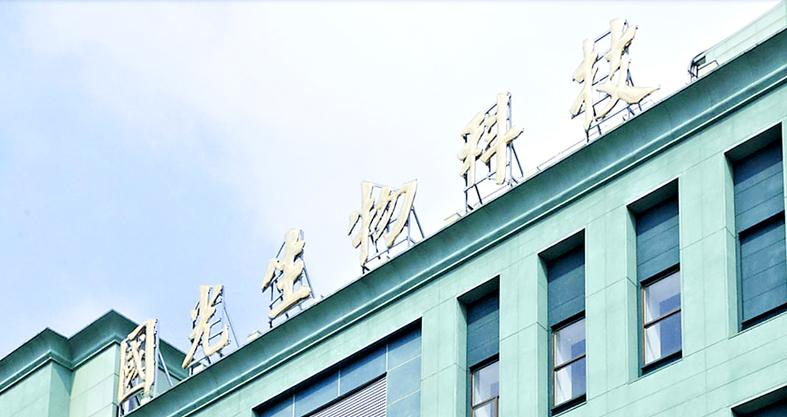Vaccine maker Adimmune Corp’s (國光生技) revenue rose 25-fold from a year earlier to NT$29.9 million (US$1.06 million) last month, thanks to shipments to foreign customers and an increase in orders of COVID-19 rapid test kits manufactured by its subsidiary Enimmune Corp (安特羅生技), it said.
Adimmune’s business is typically quiet in February, after it finishes delivering influenza vaccines to the government in January, but that was not the case this year.
The company gained more orders from overseas customers after its second fill-and-finish production line launched, it said in a statement.

Photo courtesy of Adimmune Corp
“Our production lines have been running at almost full capacity because of international orders, so we are planning to build a third and fourth production line to meet demand,” it said.
For the first two months, the company reported cumulative revenue of NT$33 million, up 15-fold from a year earlier, company data showed.
It last month obtained marketing approval from the Chinese regulator for its quadrivalent flu vaccine, and is awaiting approvals from regulators in Jordan and Pakistan, it said in filings to the Taiwan Stock Exchange.
It expects more foreign customers to order its flu vaccines or ingredients, it said in the statement.
The WHO last month announced its advice for the composition of flu vaccines for the northern hemisphere this year, recommending that they contain viruses similar to the H1N1, H3N2, Victoria and Yamagata lineages, it said.
Adimmune earlier correctly predicted the recommendation using “big data” analysis, and it had already begun manufacturing the ingredients for the vaccine, it said.

BYPASSING CHINA TARIFFS: In the first five months of this year, Foxconn sent US$4.4bn of iPhones to the US from India, compared with US$3.7bn in the whole of last year Nearly all the iPhones exported by Foxconn Technology Group (富士康科技集團) from India went to the US between March and last month, customs data showed, far above last year’s average of 50 percent and a clear sign of Apple Inc’s efforts to bypass high US tariffs imposed on China. The numbers, being reported by Reuters for the first time, show that Apple has realigned its India exports to almost exclusively serve the US market, when previously the devices were more widely distributed to nations including the Netherlands and the Czech Republic. During March to last month, Foxconn, known as Hon Hai Precision Industry

Taiwan Semiconductor Manufacturing Co (TSMC, 台積電) and the University of Tokyo (UTokyo) yesterday announced the launch of the TSMC-UTokyo Lab to promote advanced semiconductor research, education and talent development. The lab is TSMC’s first laboratory collaboration with a university outside Taiwan, the company said in a statement. The lab would leverage “the extensive knowledge, experience, and creativity” of both institutions, the company said. It is located in the Asano Section of UTokyo’s Hongo, Tokyo, campus and would be managed by UTokyo faculty, guided by directors from UTokyo and TSMC, the company said. TSMC began working with UTokyo in 2019, resulting in 21 research projects,

Ashton Hall’s morning routine involves dunking his head in iced Saratoga Spring Water. For the company that sells the bottled water — Hall’s brand of choice for drinking, brushing his teeth and submerging himself — that is fantastic news. “We’re so thankful to this incredible fitness influencer called Ashton Hall,” Saratoga owner Primo Brands Corp’s CEO Robbert Rietbroek said on an earnings call after Hall’s morning routine video went viral. “He really helped put our brand on the map.” Primo Brands, which was not affiliated with Hall when he made his video, is among the increasing number of companies benefiting from influencer

Quanta Computer Inc (廣達) chairman Barry Lam (林百里) yesterday expressed a downbeat view about the prospects of humanoid robots, given high manufacturing costs and a lack of target customers. Despite rising demand and high expectations for humanoid robots, high research-and-development costs and uncertain profitability remain major concerns, Lam told reporters following the company’s annual shareholders’ meeting in Taoyuan. “Since it seems a bit unworthy to use such high-cost robots to do household chores, I believe robots designed for specific purposes would be more valuable and present a better business opportunity,” Lam said Instead of investing in humanoid robots, Quanta has opted to invest